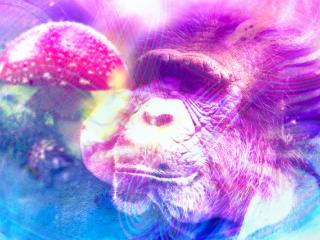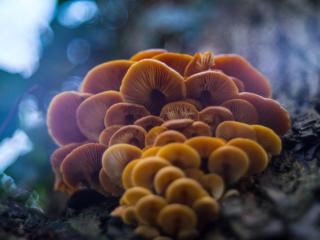Tania Munz recently wrote a biography of Karl von Frisch — the German scientist who cracked the mystery of the honeybee’s waggle dance, which shows the rest of the hive precisely where to find a new food source miles away.More
Science and Technology
In many parts of Detroit, there are blighted, abandoned patches of land. Instead of looking the other way, Timothy Paule and Nicole Lindsey started buying up vacant lots and building bee hives as an act of urban renewal.More
Christof Koch, a leading neuroscientist in the field of consciousness, says bees are smarter than we ever imagined.More
A single empty yellow chair sits next to Heather Swan’s tall, buzzing beehive in her backyard in Madison, Wisconsin. Swan keeps it there to sit next to the bees — some 60,000 insects —and talk with them.More
Heather Swan is a beekeeper and author — she tells Steve Paulson about what it's meant for her to be "chosen by the bees."More
Magic mushrooms go way back in human history. Some people even believe psychedelic mushrooms helped create human consciousness. We examine the "Stoned Ape Theory."More
Paul Stamets may be the most passionate mycologist on the planet. He tells Steve why new medicines and technologies derived from mushrooms might save life as we know it.More
Producer Charles Monroe-Kane's son goes to a school with a 13.8% non-vaccination rate. So why aren't his neighbors vaccinating their kids? Charles went out searching for the answer.More
Long before Timothy Leary's study of LSD, psychiatrist Stanislav Grof launched his own investigation of psychedelics. Since then he's devoted his life to exploring non-ordinary states of consciousness.More
Why have some parents started second guessing their pediatrician’s advice, to the point that measles is showing up in Disneyland? Historian Arthur Allen explains how we got here.More
Losing yourself in wilderness can also be a way of finding yourself, and one place you can do that is in our national parks. Renowned nature writer Terry Tempest Williams reflects on her love for these parks — especially those with desert landscapes.More
It turns out that even the most basic things we believe about ourselves are often wrong. Neuroscientist Julian Keenan says it has to do with how the brain works. He’s the author of the “Face in the Mirror: How We Know Who We Are.” More
This year marks the 50th anniversary of the death of Rachel Carson, a pioneer of the environmental movement. Rob Nixon holds the Rachel Carson chair in English at the UW-Wisconsin. He says she was something of a reluctant activist. More
Richard Holmes talks with Steve Paulson about how art and science influenced each other during the Romantic period.More
Jonah Lehrer says that the great French writer Proust described insights into the way the mind processes memory long before the scientists could prove how the brain worked.More
Ray Kurzweil tells Steve Paulson humans will merge with new technology and vastly improve their intelligence.More
Nature is more than pristine meadows and eroded canyons. There's also a history of how people have shaped and sometimes fought over the land. Lauret Savoy uncovers this shadow history and the racism that's embedded in the American landscape.More
The story of finding and recording the rarest bird in America: the Ivory-Billed Woodpecker.More


















